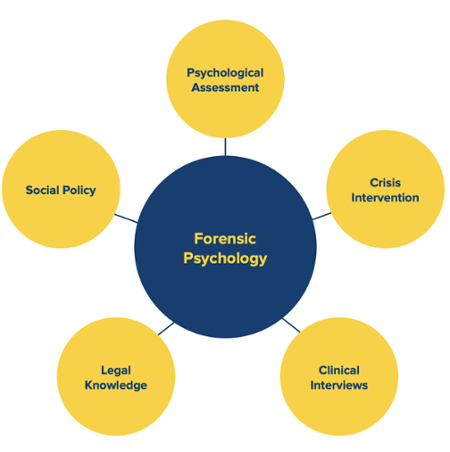
A relatively new subfield of psychology, forensic psychology is a dynamic, competitive, and mission-driven field related to psychology and the law.
Serving as one of the most impactful professions today, the field of forensic psychology needs empathetic, results-oriented professionals who can bridge the gap between individuals and the legal system. Let's explore the discipline of forensic psychology and evaluate how to become a forensic psychology professional in today's competitive professional landscape.
What is forensic psychology?
First things first: what is forensic psychology?
As a discipline, forensic psychology explores the connection between human behavior and the justice system — serving as the application of psychology to issues relating to the legal system.
With this forensic psychology definition in mind, it’s important to understand that professionals working in forensic psychology are tasked with improving the relationships between individuals and the legal system — by assessing, evaluating, and treating offenders and victims.
And this is why forensic psychology is so important: forensic psychologists are interested in understanding why certain behaviors occur and using psychological analysis to minimize negative behaviors in the future.
By gleaning tools, ideas, and clinical research from psychology and applying them to complex legal situations, forensic psychologists have the critical ability to promote the psychological well-being of individuals, communities, and organizations within a legal framework.
How to Become a Forensic Psychologist:
Since forensic psychologists are responsible for aiding the judicial system in civil and criminal matters, these professionals need strong clinical forensic skills to appropriately assess a wide variety of individuals in the legal system.
Forensic psychologists must master clinical skills, such as:
|
Clinical assessment Report writing Case presentation Interviewing |
Consultations Critical research Providing expert testimony Supervising |
These niche and critical skill sets often require the completion of a master’s degree in forensic psychology.
While enrolled in a graduate forensic psychology program, students will master the ability to adapt to industry change, conduct relevant research, and promote psychological well-being of individuals, communities, and organizations. Forensic psychologists will also have a solid understanding of social policy, psychological assessment, crisis intervention, legal knowledge, and clinical interviews.
Pro Tip: While holding a bachelor’s degree in psychology, sociology, criminal justice, criminology, or legal studies is beneficial to those thinking about obtaining a master’s in forensic psychology, students may come from a variety of undergraduate backgrounds.
what can you do with a master's in forensic psychology? chat with our forensic psychology professionals to learn more!
At Neumann University, we are proud to offer a Master of Science in Forensic Psychology — a rigorous, respected graduate program for future leaders in the field of forensic psychology.
Whether you’re an undergraduate student seeking a related graduate degree or you’re an experienced professional looking to move up in your career, Neumann’s master's in forensic psychology will provide you the skills needed to secure a meaningful career in the field.
Your questions are important to us, so in the meantime, we encourage you to book a meeting with our forensic psychology admissions counselor or request more information — we can’t wait to help you land your dream career in forensic psychology!
 CHALLENGE
CHALLENGE














